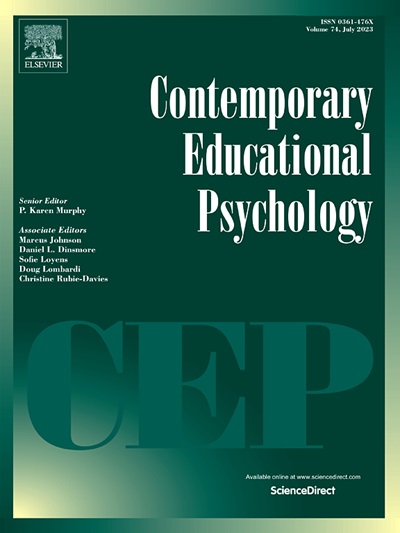“Am I trying hard or harder than others?”: Gender differences in reciprocal relations between perceived effort, science self-concept, and achievement in chemistry
IF 3.8
1区 心理学
Q1 PSYCHOLOGY, EDUCATIONAL
引用次数: 0
Abstract
High effort is critical to complete difficult introductory courses in Science, Technology, Engineering, and Mathematics (STEM) fields. However, high effort can be negatively related to science self-concept (SC) as it can indicate a lack of brilliance in STEM. Further, this relation can be more pronounced for women due to gender stereotypes. To address gender differences in the relations between perceived effort and science SC, in this study, we measured two types of perceived effort: (1) criterion effort (the perception of trying hard) and (2) comparative effort (the perception of trying harder than others), and we examined possible gender differences in their correlates. Overall, we examined whether and to what extent reciprocal relations among two types of perceived effort, science SC, and achievement differ as a function of gender over the course of a semester in introductory chemistry. We utilized multiple-group latent cross-lagged panel analysis with undergraduate students (N = 690) in introductory chemistry courses in the U.S. Our findings indicate (a) positive roles of criterion effort for women, (b) negative roles of comparative effort for both genders, and (c) reciprocal relations between two types of perceived effort and achievement, which were more pronounced for women, in introductory chemistry. These findings suggest that promoting criterion effort and deemphasizing comparative effort will ultimately encourage science SC and success for both genders in STEM.
“我是否比别人更努力?”:感知努力、科学自我概念和化学成就之间相互关系的性别差异
要完成科学、技术、工程和数学(STEM)领域的困难入门课程,付出很大的努力是至关重要的。然而,高度努力可能与科学自我概念(SC)负相关,因为它可能表明在STEM方面缺乏才华。此外,由于性别刻板印象,这种关系在女性身上更为明显。为了解决感知努力与科学SC之间关系的性别差异,在本研究中,我们测量了两种感知努力:(1)标准努力(努力的感觉)和(2)比较努力(比别人更努力的感觉),并研究了它们之间可能存在的性别差异。总的来说,我们研究了在一个学期的化学入门课程中,两种类型的感知努力,科学SC和成就之间的互惠关系是否以及在多大程度上作为性别的函数而不同。我们利用多组潜在交叉滞后面板分析,对美国化学入门课程的本科生(N = 690)进行了分析。我们的研究结果表明(a)标准努力对女性有积极作用,(b)两性的比较努力有消极作用,(c)在化学入门课程中,两种类型的感知努力和成就之间存在相互关系,这在女性中更为明显。这些发现表明,促进标准努力和减少比较努力最终将鼓励科学SC和STEM中男女的成功。
本文章由计算机程序翻译,如有差异,请以英文原文为准。
求助全文
约1分钟内获得全文
求助全文
来源期刊

Contemporary Educational Psychology
PSYCHOLOGY, EDUCATIONAL-
CiteScore
16.50
自引率
3.90%
发文量
74
期刊介绍:
Contemporary Educational Psychology is a scholarly journal that publishes empirical research from various parts of the world. The research aims to substantially advance, extend, or re-envision the ongoing discourse in educational psychology research and practice. To be considered for publication, manuscripts must be well-grounded in a comprehensive theoretical and empirical framework. This framework should raise critical and timely questions that educational psychology currently faces. Additionally, the questions asked should be closely related to the chosen methodological approach, and the authors should provide actionable implications for education research and practice. The journal seeks to publish manuscripts that offer cutting-edge theoretical and methodological perspectives on critical and timely education questions.
The journal is abstracted and indexed in various databases, including Contents Pages in Education, Australian Educational Index, Current Contents, EBSCOhost, Education Index, ERA, PsycINFO, Sociology of Education Abstracts, PubMed/Medline, BIOSIS Previews, and others.
 求助内容:
求助内容: 应助结果提醒方式:
应助结果提醒方式:


